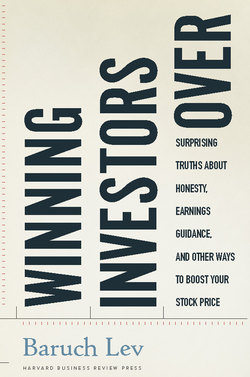Читать книгу Winning Investors Over - Baruch Lev - Страница 12
На сайте Литреса книга снята с продажи.
Riding a Tiger
ОглавлениеWhy are some earnings disappointments punished severely, while others escape unscathed? The long answer is that there are many reasons. A sales, cash flow, or gross margin disappointment jointly disclosed with the earnings miss obviously paints a particularly bleak picture of things to come. So is an earnings miss coupled with a downcast management outlook of the future. But there is an equally important, although less appreciated, determinant of the reaction to an earnings miss and, importantly, one that managers can proactively alleviate: investors’ pre-miss growth expectations.
In a comprehensive study of the consequences of missing, meeting, or beating consensus quarterly estimates, published in 2002, accounting researchers Doug Skinner and Richard Sloan documented that the stocks of companies that missed the consensus dropped by 5 percent, on average, whereas those that beat the consensus increased 5.5 percent (prices of companies that exactly met the forecast rose by 1.6 percent), over the three months ending with the earnings release (thereby reflecting investors’ aggregate reaction to managers’ guidance and analysts’ forecast revisions made prior to the final earnings announcement).12 The important insight of Skinner and Sloan came from ranking the disappointing companies by investors’ growth expectations prior to the earnings release, as measured by the market-to-book ratio (the ratio of the forward-looking stock price to the historical-based book or equity value per share). Whereas the disappointers with low prior growth expectations saw their stock prices decrease by 3.6 percent, the earnings disappointers with high prior growth expectations experienced a double price whammy: a 7.3 percent drop.13
Even more surprising, the price hit to an earnings miss is only slightly affected by the magnitude of the disappointment, and even small shortfalls of a penny or two by erstwhile highfliers result in sharp price declines, as in eBay and Google. Moreover, whereas for all stocks, investor reaction to positive and negative surprises is roughly symmetrical, for high-growth stocks, the negative reaction to an earnings disappointment is substantially more severe than the reward for a similar positive surprise. Paraphrasing Willing Congreve in The Mourning Bride, hell hath no fury like a shareholder scorned. The price hit to disappointing highfliers is accentuated by “momentum investors,” that breed of market players riding the growth tiger, who are quick to bail out on the first sign of the end of growth—often an earnings disappointment. This helps explain why the magnitude of the consensus miss matters little. Any miss signals the end of the dream.
There are two important lessons for managers here. The first is reflected in the familiar adage, there is no free lunch. Investors’ growth expectations and the consequent elevated stock price have their obvious benefits—lower cost of capital, high managerial stock-based compensation, employment attraction—while the favorable situation lasts, but the retribution for even minor faltering of the growth is commensurately high. Second, the research I discuss in the next section indicates that investors and financial analysts tend to be overly optimistic about the growth prospects of companies with good track records, believing that the fast-growing sales and earnings will persist far into the future. The steep stock price decline upon a consensus miss is, therefore, not just a reaction to the disappointing earnings, but primarily a correction of the overly optimistic growth expectations. The message to managers is that if you suspect that your company’s stock is overheated, outstripping the business fundamentals, resist the temptation to ride the tiger—go along with the market—and instead gradually cool off investors’ enthusiasm to avoid their wrath when the inevitable end-of-growth materializes. In chapter 5 I provide diagnostics on how to identify overheated stocks and prescribe safe means of dismounting the tiger.
